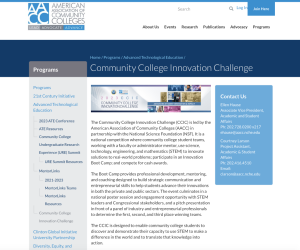Community College Innovation Challenge Relaunch, 2020-2022

The U.S. workforce is rapidly changing. The new world of work will require workers to acquire vital employability skills as well as engaging in life-long learning to keep technological skills current. In its 2019 report "Charting a Course for Success: America's Strategy for STEM Education" the National Science and Technology Council of the White House discusses the need for entrepreneurial education and opportunities to meet changing workforce demands. To respond to these needs, the American Association of Community Colleges (AACC) will cultivate innovation and entrepreneurship and support undergraduate research experiences for community college students by leading the re-launch of the Community College Innovation Challenge (CCIC). AACC successfully partnered with the National Science Foundation to host the 2015-2018 CCIC competitions and has worked to re-envision and strengthen this offering to garner greater numbers of student team applications, provide professional and leadership development opportunities for students and for faculty, and to raise awareness of the valuable contributions of community colleges in STEM innovation. The proposed activities will enable community college students to discover and demonstrate their capacity to use STEM to make a difference in the world. CCIC participation will prepare students with workplace skills; offer potential pathways to student retention, completion, and employment; and provide an opportunity to create STEM-based products and services of potential benefit to society. The CCIC contributes to enabling the U.S. to remain a global leader in STEM literacy, innovation, and employment by nurturing student/faculty collaborations on UREs and providing a venue for leadership development and technical assistance. The CCIC is also expected to have an impact on promoting the value and national significance of community college leadership in STEM innovation, entrepreneurship, and meeting the rising demand for a highly-skilled U.S. workforce.
The AACC proposes to:
- Develop a national request for applications and launch an annual Community College Innovation Challenge in 2020, 2021, and 2022. Teams of 2-4 community college students, working alongside a faculty mentor, will be asked to craft innovative STEM-based solutions for real world problems that are aligned with NSF's Ten Big Ideas.
- Create and implement a strategic dissemination and outreach plan designed to reach greater numbers of community college students and faculty to raise awareness and encourage submissions.
- Host three CCIC Boot Camps in 2020, 2021, and 2022 to convene the 10-13 finalist teams selected each year through a national application process. The Boot Camp is a four-day event, modeled on NSF's Innovation Corps (I-Corps) model, designed to provide hands-on opportunities for the teams to learn communication, business, and entrepreneurial strategies to further their STEM innovations. The Boot Camp features a high-profile poster session on Capitol Hill, and a final presentation to a panel of judges in a "Shark Tank" format to determine the first and second place winning teams.
- Leverage collaborations with experienced professionals from NSF's I-Corps program; strategic communication and social change agencies; and the National Association for Community College Entrepreneurship on the development of the Boot Camp agenda, resources, and materials.
- Disseminate nationally information on the CCIC winners and the significant role of community colleges in leading undergraduate research, STEM innovation, and entrepreneurship efforts.
These activities will advance the knowledge and understanding of various STEM technician education fields and technologies and their role in ideation and innovation. The CCIC will enrich and support students in learning vital employability skills; cultivate STEM innovations that translate knowledge into action; and provide professional and leadership development opportunities for student and faculty teams. In addition, CCIC information and resources to support community college UREs and entrepreneurial education will be disseminated on a national level.
Comments